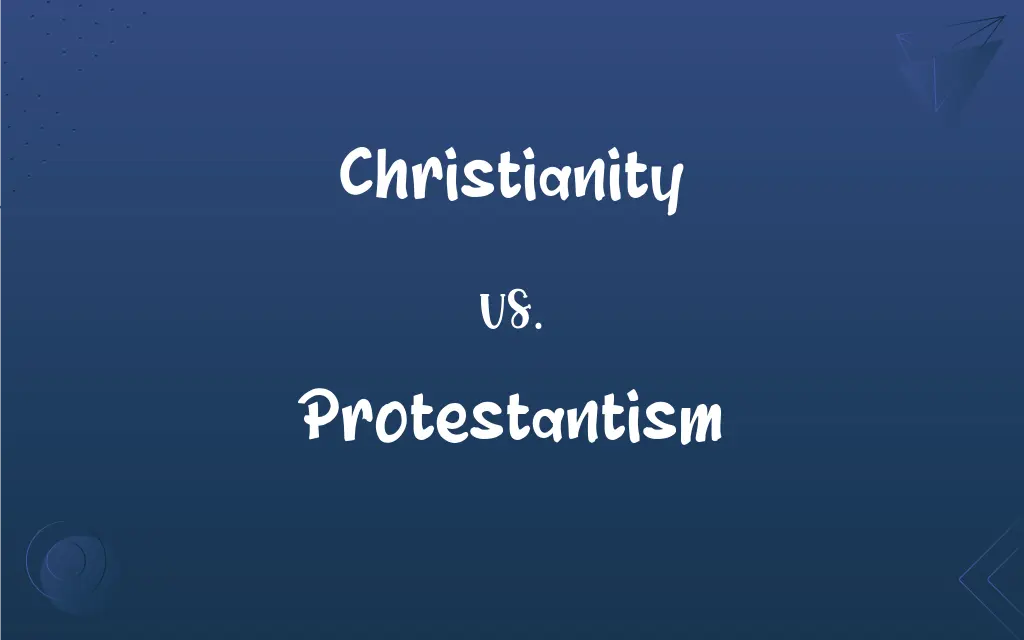Christianity vs. Protestantism: What's the Difference?
Edited by Aimie Carlson || By Janet White || Published on January 16, 2024
Christianity is a major world religion based on the teachings of Jesus Christ, while Protestantism is a branch of Christianity that originated from the Reformation, focusing on the authority of Scripture and justification by faith.

Key Differences
Christianity, founded on the life and teachings of Jesus Christ, is a monotheistic religion encompassing various denominations, including Catholicism, Orthodoxy, and Protestantism. Protestantism arose in the 16th century as a movement within Christianity, challenging certain doctrines and practices of the Roman Catholic Church, particularly the authority of the Pope and the church's role in salvation.
In Christianity, the Bible is revered as sacred scripture, but interpretations and emphasis on different parts vary among denominations. Protestantism places a strong emphasis on the Bible as the sole source of religious authority, a principle known as "Sola Scriptura," and generally interprets the Bible more literally than some other Christian traditions.
Christian rituals and practices, such as baptism and communion, are observed across all denominations, but their significance and mode of practice differ. Protestantism typically views these sacraments symbolically rather than as a means of imparting saving grace, as in some other Christian traditions.
Christianity as a whole encompasses a diverse range of beliefs and practices, reflecting its broad and historical development over two millennia. Protestantism, while diverse within itself, represents a specific response to certain Christian doctrines and practices, advocating for a personal relationship with God and often rejecting hierarchical church structures.
Comparison Chart
Founder
Based on the teachings of Jesus Christ
Originated from the Reformation in the 16th century
ADVERTISEMENT
Key Principles
Belief in Jesus Christ, Trinity, salvation
Sola Scriptura, priesthood of all believers, justification by faith
Scripture Interpretation
Varies among denominations
Emphasis on literal and personal interpretation
Sacraments
Diverse views on baptism, communion, etc.
Typically symbolic interpretation of sacraments
Church Structure
Includes hierarchical structures (Catholic, Orthodox)
Generally rejects hierarchical structures
Christianity and Protestantism Definitions
Christianity
Christianity includes various denominations like Catholic, Orthodox, and Protestant.
The diversity in Christianity reflects its rich history.
ADVERTISEMENT
Protestantism
Protestantism is a branch of Christianity that arose during the 16th-century Reformation.
Protestantism began as a reform movement within the Christian Church.
Christianity
Christianity has a significant influence on art, culture, and philosophy.
Christianity has shaped much of Western art and literature.
Protestantism
Protestantism includes denominations like Baptists, Lutherans, and Methodists.
There are many Protestant denominations, each with unique beliefs and practices.
Christianity
Christianity emphasizes the concepts of love, forgiveness, and redemption.
Christian teachings often focus on love and compassion.
Protestantism
Protestantism played a significant role in shaping modern Western society.
The influence of Protestantism is evident in various aspects of culture and ethics.
Christianity
Christianity celebrates important religious holidays like Easter and Christmas.
Christmas is a major holiday in Christianity, commemorating the birth of Jesus.
Protestantism
Protestantism emphasizes the authority of the Bible and justification by faith.
In Protestantism, personal reading and interpretation of the Bible are encouraged.
Christianity
A religion based on the life and teachings of Jesus. Most forms of Christianity hold that Jesus is the son of God and is the second person of the Trinity, through whom humans may attain redemption from sin.
Protestantism
Protestantism often rejects the hierarchical structure of the Catholic Church.
Protestant churches typically have a more decentralized structure.
Christianity
Christians as a group; Christendom.
Protestantism
Adherence to the religion and beliefs of a Protestant church.
Christianity
The state or fact of being a Christian.
Protestantism
The religion and religious beliefs fostered by the Protestant movement.
Christianity
Pl. Chris·ti·an·i·ties A particular form or sect of the Christian religion
The Christianities of antiquity.
Protestantism
Protestants considered as a group.
Christianity
The religion of Christians; the system of doctrines and precepts taught by Christ.
Protestantism
The quality or state of being protestant, especially against the Roman Catholic Church; the principles or religion of the Protestants.
Christianity
Practical conformity of one's inward and outward life to the spirit of the Christian religion
Protestantism
The theological system of any of the churches of western Christendom that separated from the Roman Catholic Church during the Reformation
Christianity
The body of Christian believers.
To Walys fled the christianiteeOf olde Britons.
Christianity
A monotheistic system of beliefs and practices based on the Old Testament and the teachings of Jesus as embodied in the New Testament and emphasizing the role of Jesus as savior
Christianity
The collective body of Christians throughout the world and history (found predominantly in Europe and the Americas and Australia);
For a thousand years the Roman Catholic Church was the principal church of Christendom
Christianity
Christianity is a monotheistic religion based on the life and teachings of Jesus Christ.
Christianity has billions of followers worldwide.
FAQs
What is the significance of Jesus in Christianity?
Jesus is central in Christianity, revered as the Son of God and the savior of humanity.
Who is the founder of Christianity?
Christianity is founded on the teachings of Jesus Christ, whom Christians believe to be the Son of God.
What are Christian sacraments?
Sacraments are religious rites; common ones include Baptism and Communion.
What is the holy book of Christianity?
The Bible, consisting of the Old and New Testaments, is the holy book of Christianity.
What are the main branches of Christianity?
The main branches are Catholicism, Protestantism, and Eastern Orthodoxy.
Who leads a Christian church service?
Services are usually led by ordained clergy like priests or pastors.
What are the key beliefs of Protestantism?
Key beliefs include justification by faith alone, the authority of the Bible, and the priesthood of all believers.
What is the Christian view of the afterlife?
Christians generally believe in an afterlife, where souls go to heaven or hell based on their faith and actions.
Who initiated the Protestant Reformation?
Martin Luther, a German monk, is credited with initiating the Reformation in 1517.
What is Christianity?
Christianity is a monotheistic religion based on the life and teachings of Jesus Christ as described in the New Testament.
What is the importance of the church in Christianity?
The church is a community of believers and a place of worship, central to Christian practice.
What are some major Protestant denominations?
Major denominations include Baptists, Methodists, Lutherans, and Presbyterians.
What are Christian holidays?
Major Christian holidays include Christmas (Jesus' birth) and Easter (Jesus' resurrection).
What is Protestantism?
Protestantism is a branch of Christianity that originated with the Reformation, a movement against certain doctrines and practices of the Catholic Church.
What is Sola Scriptura?
Sola Scriptura is a Protestant principle meaning "Scripture alone," emphasizing the Bible as the sole authoritative source of religious truth.
How does Protestantism differ from Catholicism?
Protestantism rejects papal authority, emphasizes the Bible's authority, and often differs in practices like communion and confession.
Do Protestants celebrate the Eucharist?
Many do, but interpretations and practices of the Eucharist vary among denominations.
What role do pastors play in Protestant churches?
Pastors lead services, provide spiritual guidance, and often play a key role in church governance.
How does Protestantism view salvation?
Salvation is seen as a gift from God, attainable through faith in Jesus Christ, not through deeds.
What is the Protestant ethic?
The Protestant ethic refers to a view emphasizing hard work, discipline, and frugality, historically linked to Protestant values.
About Author
Written by
Janet WhiteJanet White has been an esteemed writer and blogger for Difference Wiki. Holding a Master's degree in Science and Medical Journalism from the prestigious Boston University, she has consistently demonstrated her expertise and passion for her field. When she's not immersed in her work, Janet relishes her time exercising, delving into a good book, and cherishing moments with friends and family.
Edited by
Aimie CarlsonAimie Carlson, holding a master's degree in English literature, is a fervent English language enthusiast. She lends her writing talents to Difference Wiki, a prominent website that specializes in comparisons, offering readers insightful analyses that both captivate and inform.
































































